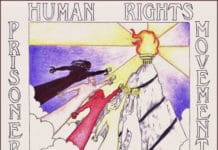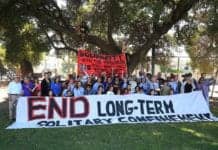by the Center for Human Rights and Constitutional Law
A year ago on July 8, over 30,000 people inside California prisons began a hunger strike to bring an end to the state’s use of indefinite solitary confinement. On the one-year anniversary of the largest prisoner hunger strike in California history, the Center for Human Rights and Constitutional Law (CHRCL) today is filing a lawsuit charging Jeffrey Beard, secretary of the California Department of Corrections and Rehabilitation (CDCR), and CDCR with illegally refusing to publicly disclose information, data and studies regarding its solitary confinement rules, policies and practices.

The lawsuit is brought under the Public Records Act in order to achieve greater transparency regarding the conditions which gave rise to the hunger strike and CDCR’s current policies and practices of solitary confinement. CDCR’s use of isolated segregation is an important and legitimate matter of public concern. The lawsuit is filed in the Superior Court of Sacramento.
The original four hunger strikers in Pelican Bay State Prison, Sitawa Nantambu Jamaa (R.N. Dewberry), Todd Ashker, Antonio Guillen and Arturo Castellanos, issued the following statement today: “We believe the hunger strike of 2013, joined by thousands of prisoners, led to increased public awareness and momentum for reform with regards to California’s excessive use of solitary confinement.
“However, only small incremental improvements have been experienced by prisoners in solitary confinement, while the vast majority of prisoners continue to suffer cruel and degrading treatment and hunger strikers have experienced official retaliations by CDCR for engaging in an entirely peaceful protest. We wish to express our solidarity with and extend our deepest gratitude to our family members and community advocates who have worked tirelessly to make positive changes in California’s outdated, costly and unjust solitary confinement policies.”

Dolores Canales, founder of California Families Against Solitary Confinement, issued the following statement today: “Family members of thousands of prisoners in solitary confinement in California have suffered tremendously along with their loved ones in prison. Limited opportunities for visitation with family members and the total absence of contact visits unfairly punishes family members and breaks down family bonds and relationships.
“Families are proud of their loved ones who, one year ago, courageously took the only peaceful and rational approach available to them to protest their inhumane treatment by refusing food. Gov. Brown should immediately reassess the rampant and unprecedented use of solitary confinement by his administration, including placing thousands of prisoners in solitary confinement for mere alleged gang affiliation, even when these prisoners have engaged in no serious wrongdoing or rule violations.”
Peter Schey, president of the Center for Human Rights and Constitutional Law and lead counsel in the Public Records Act case, issued the following statement today: “Little verifiable information is available to California’s citizenry on the number of prisoners in solitary confinement in California and the extent of their mistreatment.

“We know there are approximately 11,000 prisoners in California in solitary confinement, many suffering serious mental and physical medical conditions as a result of their inhumane conditions of confinement. CDCR places prisoners in isolated segregation far more frequently and for far longer periods – in some cases for decades – than any other state or country on earth. Gov. Brown should be ashamed of this record.”
United Nations Special Rapporteur on Torture and Other Cruel, Inhuman and Degrading Treatment or Punishment Juan Mendez issued the following statement: “I express my deepest solidarity with the inmates and their relatives, who are demanding a change in the state’s excessive use of solitary confinement as a disciplinary measure for prolonged periods by prison authorities under the California Department of Corrections and Rehabilitation.
“I have urged the United States government on various occasions to abolish the use of prolonged or indefinite solitary confinement. I also urged the government to adopt concrete measures, including an absolute ban on solitary confinement of any duration for [among others] juveniles, persons with psychosocial disabilities or other disabilities or health conditions … as well as those serving a life sentence and prisoners on death row.”

The 2013 hunger strike was joined by thousands of prisoners in and outside California and resulted in retaliatory actions being taken against those who participated in the hunger strike. Despite efforts by advocates and legislators, the CDCR continues its much-criticized practice of placing inmates into segregated isolation or security housing units (SHU) for unconscionably long periods.
It is the indefinite nature of SHU sentences and the highly suspect gang validation process of the CDCR that is prompting the call for increased transparency of the CDCR’s policies and practices regarding solitary confinement.
For more information, contact Dolores Canales at dol1canales@gmail.com and Peter Schey at pschey@centerforhumanrights.org.

 Store
Store












